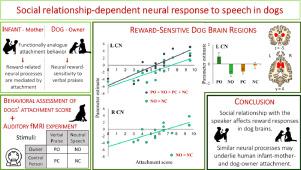NeuroImage ( IF 5.7 ) Pub Date : 2021-08-16 , DOI: 10.1016/j.neuroimage.2021.118480 Anna Gábor 1 , Attila Andics 1 , Ádám Miklósi 2 , Kálmán Czeibert 3 , Cecília Carreiro 3 , Márta Gácsi 2

|
In humans, social relationship with the speaker affects neural processing of speech, as exemplified by children’s auditory and reward responses to their mother's utterances. Family dogs show human analogue attachment behavior towards the owner, and neuroimaging revealed auditory cortex and reward center sensitivity to verbal praises in dog brains. Combining behavioral and non-invasive fMRI data, we investigated the effect of dogs’ social relationship with the speaker on speech processing. Dogs listened to praising and neutral speech from their owners and a control person. We found positive correlation between dogs’ behaviorally measured attachment scores towards their owners and neural activity increase for the owner’s voice in the caudate nucleus; and activity increase in the secondary auditory caudal ectosylvian gyrus and the caudate nucleus for the owner’s praise. Through identifying social relationship-dependent neural reward responses, our study reveals similarities in neural mechanisms modulated by infant-mother and dog-owner attachment.
中文翻译:

狗对语言的社会关系依赖性神经反应
在人类中,与说话者的社会关系会影响语音的神经处理,例如儿童对母亲话语的听觉和奖励反应。家养的狗对主人表现出类似人类的依恋行为,神经影像学显示听觉皮层和奖励中心对狗大脑中的口头赞美很敏感。结合行为和非侵入性 fMRI 数据,我们研究了狗与说话者的社会关系对语音处理的影响。狗听主人和控制者的赞美和中立的言论。我们发现狗对主人的行为测量依恋分数与主人尾状核中主人声音的神经活动增加之间存在正相关关系;并增加第二听觉尾侧外侧裂回和尾状核的活动以获得主人的称赞。通过识别依赖于社会关系的神经奖励反应,我们的研究揭示了由婴儿母亲和狗主人依恋调节的神经机制的相似性。



























 京公网安备 11010802027423号
京公网安备 11010802027423号